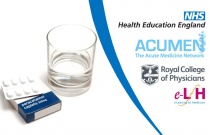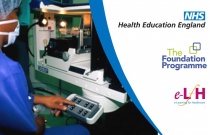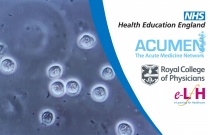Investigation and Management of Paracetamol Overdose
Louise Ma
0.50 Hours
This session considers the basic pathophysiology underlying paracetamol overdoses. It then discusses appropriate investigation and management of the clinical problem.
Models of the Consultation
Roger Neighbour
0.50 Hours
This session describes various models of the general practice consultation, and details how to use each one. The session is intended to be a basis for the subsequent GP consultation sessions.
Gathering Information
Connie Wiskin
This session considers what is required to gather good quality, relevant information during the consultation.
Back Pain with Red Flags
Jon Greenwell GP with Special Interest in musculoskeletal disorders
0.50 Hours
This session discusses the common causes of serious pathology in back pain and the red flags that patients present with that would increase your clinical suspicion. Common signs and symptoms are presented.
Domestic Violence
Satpal Shekhawat General Practitioner
0.50 Hours
This session will guide you through a consultation where you will manage a patient with signs of domestic violence.
Effective Communication with People Who Have Learning Disabilities
Jo Corbett
0.50 Hours
The session aims to provide a range of information and ideas that can be used to improve communication when consulting with people who have learning disabilities.
Long-Acting Reversible Contraception (LARC) Overview
Alison Swain
0.50 Hours
This session addresses the long-acting reversible methods of contraception, including their effectiveness, thus ensuring knowledge of how to access these methods of contraception for our patients.
Level 2 Part C - Record in Secondary Care
Andrea Goddard
0.50 Hours
This session will help clinical staff who have some degree of contact with children and young people and/or parents/carers to know how to record concerns that a child is, or might be being maltreated. It is important to note that throughout the session, the terms ‘child’ and ‘children’ mean anyone younger than 18 years old.
Level 2 - Part B - Response in Primary Care
Andrea Goddard Consultant Paediatrician
0.50 Hours
This session will help clinical and non-clinical staff in primary care who have regular contact with parents, children and young people to know how to respond when they have concerns that a child is being abused.
Introduction to Patient Safety in Primary Care - A GP's Story
Aneez Esmail Professor of General Practice, University of Manchester
0.50 Hours
This session illustrates a real GPs understanding of what patient safety means in primary care. This session was reviewed by Sally Higginbottom and last updated in November 2014.
Endocrine Problems in Primary Care - An Overview
Berenice Lopez Specialist Registrar, North Bristol
0.25 Hours
This session considers three important abnormalities of the endocrine system and how they might present in primary care.
Incident Reporting in Primary Care
Jane Carthey Patient Safety and Human Factors Specialist and Christine Johnson General Practitione
0.50 Hours
This session introduces GPs to national incident reporting in the NHS and provides some practical tips on how to encourage incident reporting in your practice. This session was reviewed by Suchita Shah and last updated in February 2015.
Management of Sexually Transmitted Infections in Young People
Dawn Wilkinson Genitourinary Medicine/HIV Consultant at Imperial College Healthcare NHS Trust.
0.50 Hours
This session aims to help you identify specific adolescent issues related to the presentation, diagnosis and management of sexually transmitted infections (STIs) in young people.
Growth Patterns And Growth Prediction
Derrick Willmot
This session discusses how craniofacial and whole body growth can be assessed and used in addition to other methods of growth estimation and growth prediction.
Multi-Surface and Core Restorations: Vital and Non-vital Teeth
Julian Satterthwaite, Carly Taylor
This session will cover the principles and procedures for placement of multi-surface restorations and cores. The different materials and techniques available when placing core restorations will also be presented.
Interpretation of Investigations: Practical Application
John Saetta
0.50 Hours
This session discusses some common investigations and clinical conundrums. It emphasises the importance of having access to the range of values for common tests and timely action on abnormal results. Interpreting investigations correctly and wisely will help contribute towards your doctor/patient relationship.
Management of the Sudden Unexpected Death of a Child
Joanna Garstang
0.50 Hours
This session describes a case of unexpected infant death, with child protection concerns, highlighting the role of the paediatrician and examining the role of other healthcare professionals in a multi-agency environment. The session also introduces Serious Case Reviews. These sessions have been updated in 2015 by Dr Fiona Straw,....
Clinical Manifestations of Diabetic Autonomic Neuropathy
Ida Pernicova
0.25 Hours
This session examines the symptoms of diabetic autonomic neuropathy.
Endocrine Causes of Fever
Andrew Solomon
0.25 Hours
Pyrexia or fever of unknown origin (PUO) is an important presentation in clinical medicine. This session describes the subcategories of PUO caused by endocrine conditions and will help in learning the process of differential diagnosis.
Investigation and Management of Dyspepsia
Shopnara Khanam
0.50 Hours
This session discusses the alarm symptoms of dyspepsia. It examines the causes of dyspepsia, with a particular focus on peptic ulcer disease and Helicobacter pylori (H pylori). It also addresses the indications for endoscopy and the management of dyspepsia.
Investigation and Management of Urinary Tract Infection
Chee Kay Cheung
0.50 Hours
This session covers the investigation and management of a patient presenting with dysuria.
Immunisation in Children
Rajiv Mittal
0.50 Hours
Interactive discussion about immunisation in children covering common scenarios for GP practices. This session was reviewed by Dirk Pilat and last updated on 18/07/17.
Methods of Wax Removal
Ewa Raglan
0.50 Hours
This session will help you to recognise the presence of wax in the external auditory canal and provide a description of the methods for its removal either in general practice, or by the audiologist. It will also discuss the contra-indications to its removal.
Falls Assessment in Older People
Vinay Karanam and Nataraj Kasaravalli
0.50 Hours
A third of people over the age of 65 will have at least one fall in the next year. Management in primary care aims to reduce the consequences of falls on the individual and society. This session considers risk factors for falling, provides a framework for GPs to assess patients who have fallen in the community, and reviews the m....
National Clinical Guideline for Stroke
Tony Rudd FRCP CBE
0.50 Hours
The guideline provides a comprehensive examination of stroke care, encompassing the whole of the stroke pathway from acute care through to longer-term rehabilitation, including secondary prevention. The edition also informs healthcare professionals about what should be delivered to stroke patients and how this should be organise....
























